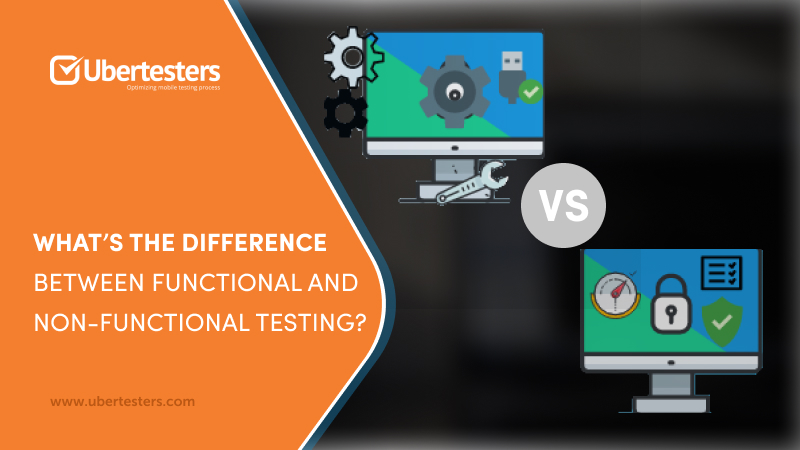The Major Differences Between Functional and Non-functional Testing

Most QA plans and strategies contain both functional and non-functional testing. However, not all quality assurance professionals or product managers understand the difference between these two testing types. In this post, we will clarify the major distinction between functional and non-functional QA efforts. What are the expectations and requirements of these types of testing? What is their focus area? Let’s discover the basic facts about each one.
What should you know about functional testing?
To begin with, functional testing is one of the most effective techniques of black box testing. What does it mean? It means that this type of testing is used to check whether the app or service is operating according to the specifications, provided by the customer or the marketing team. Actually, the QA expert compares the expected results of testing the software with the actual ones. Each function should be operating according to the customer’s specifications and show off a top-notch execution. The functional testing requirement is to give a clear picture of the system’s behavior. The main question this testing gives the answer is “What does the application do?”
Functional testing usually includes various types of testing:
- Regression testing
- Unit testing
- Localization testing
- Sanity testing
- Smoke testing
- Integration testing
- User acceptance testing
It is also important to note that functional tests can be performed both manually and automatically.
As a rule, functional testing involves a wide range of techniques:
- Installation: testing the installation procedure for mobile and desktop apps
- API: making sure both external and internal APIs are working properly
- Unit: checking whether each software’s unit is executing as expected
- Regression: testing whether the new changes in the program haven’t negatively affected the other app’s functions and options
All functional tests always have a clear input data and have a comprehensive pass and fail criteria.
The basic concepts of non-functional testing
The non-functional tests include totally different types of system testing. It deals with non-functional software’s parameters, such as usability, security, reliability, scalability, and other features. To put it short, this type of QA effort is about checking the program’s behavior and performance, but not its functions. Non-functional testing is performed to make sure the customers will have the best user experience when using the service. The app should be understandable, convenient, stable, and user-friendly.
Here is a list of top facts about non-functional testing:
- Ensures the high maintainability and efficiency of the product
- Optimizes the program’s installation and configuration
- Reduces the risks that are connected with the non-functional areas of the software
- It is the same important as a functional one
The nonfunctional testing requirement is to describe the usability of the system in detail. This type of testing is designed to answer the question “How well does the system operate?” The execution of these tests is usually made automatically.
As a rule, non-functional testing covers various types of QA efforts:
- Usability: checking whether the GUI is simple and easy-to-use
- Load: making sure the system operates well with different number of users
- Stress: checking the program’s behavior in stress environments (for example, when there are certain server issues)
- Security: exploring the vulnerabilities and weak points of the software
- Recovery: checking how quickly and effectively the system can recover from big errors or crashes
- Compliance: checking whether the system meets the standards of a certain company or industry
Non-functional testing is performed to check a list of various parameters:
- Usability. This is one of the most important features of any software. It ensures the service meets the users’ expectations and is easy to operate. User’s comfort is a key option when it comes to checking the usability features.
- Flexibility. Most kinds of software should fit various types of devices. This means flexibility is tightly connected with using the app on different operating systems, gadgets, carriers, and types of connection.
- Security. This aspect is about eliminating risks and threats. Security is another vital feature of any program or service.
- Efficiency. This parameter is checked to make sure the response time of a system is acceptable and meets certain requirements.
- Scalability. The testing is made to check how the service performs when increasing its processing capacity.
The key differences between the two types of testing
- Functional testing is usually performed before non-functional
- Functional testing deals with testing features and functions, while non-functional is about checking usability, security, reliability, and other non-functional parameters
- Functional testing is for checking functions, while non-functional is for performance
- Non-functional testing is linked with meeting the user’s expectations, while functional testing is linked with customer’s requirements
- Functional testing can be easily executed manually, while non-functional is more about automation.
Who should perform these types of testing?
On one hand, non-functional testing is supposed to use various automated tools, like Neoload, Loadrunner, JMeter, and others. On the other hand, functional testing is more effective when using manual QA procedures. Therefore, using crowd testing services in addition to in-house QA teams will provide you with lots of benefits and best outcome. The fact is that crowd testing helps thousands of companies to get many non-biased users and global QA experts to test the performance of the app, program, or service on a great deal of device’s types, operation systems, locations, and carriers. Many companies find that their app won’t behave the same way on a different device or a specific location, thus, especially when it comes to a mobile app, one must utilize crowd testing to ensure the app is operating well under all possible scenarios and conditions. In case you are looking for top-quality crowd testing services, Ubertesters is always here to help.
Want to know more about testing opportunities? Contact us at sales@ubertesters.com

